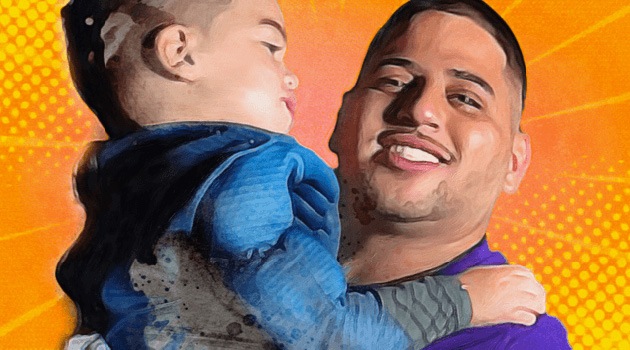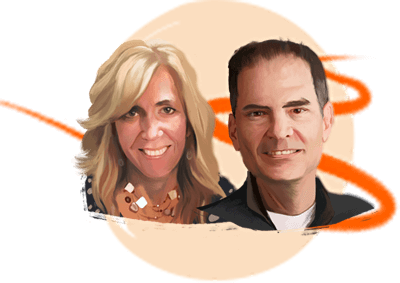Avram is the proud father of 3 children, the oldest of whom is living with Hunter syndrome. In this candid interview, Avram shares how his family has navigated life’s ups and downs since his son’s diagnosis. He also offers practical stories on how he has managed his son's cognitive and behavioral challenges.
You can listen to Avram’s full interview, or read the highlights below.

Interview highlights
Q:Hello, Avram! Thank you so much for joining us today. To start things off, would you mind introducing yourself and your family?
A:My name is Avram, and I have a beautiful wife, Monica. We have been together for 14 magical years and have 3 amazing children: Kalel, Logan, and Anaya. Our lives changed forever on April 29, 2016, when my oldest, Kalel, was diagnosed with Hunter syndrome after his third birthday.
To tell you more about our family—I’d like to think of myself as a fairly passive guy. I’m happy most of the time. My wife, Monica—she’s the true blessing in our family. She’s the sweetest lady you’ll ever meet, with a heart of gold; she’s definitely the rock of our family. Anaya is our warrior princess—she’s only a few months old, but I can already tell she’s going to be something special.
Logan is our 7-year-old, whom we named after Wolverine. He’s the younger big brother who takes pride in keeping our family balanced with his sense of humor and tenacious personality.
Kalel, our 8-year-old, is named after Superman. He’s the wild child of our family—he keeps us on our toes! We gave him the nickname Sour Patch Kid because first he’s sour, then he’s sweet—one of the sweetest kids you’ll ever meet, actually. His smile lights up the room. Kalel is also the loudest one in our family, and he shows off his skills bright and early every morning. When you put us all together, we’re the superhero family!
After Kalel was diagnosed, Monica and I founded the MPS SuperHero Foundation. We’ve been active in the Hunter syndrome community since 2016. We have presented and advocated at conferences and hospitals and talked to healthcare providers and other parents as well.

Q:It’s fantastic to hear how much you have contributed to the Hunter syndrome community! Could you tell us more about how Kalel was diagnosed?
A:Kalel was born on January 6, 2013. Monica noticed that even as a newborn, Kalel had a slight breathing issue.
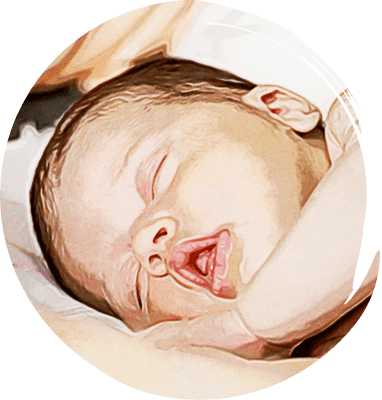
“We’ve never met a newborn who snored! We were told the same thing across the board: ‘This is common in boys; he’ll grow out of it.’”
Kalel also had childhood problems like ear infections, tonsils, adenoids, and other issues. When your child has all of the “common” issues, things don’t seem common anymore. Monica was already raising concerns to the pediatricians when Kalel was a month old, but these were dismissed. By 6 months, she insisted on a referral to an ear, nose, and throat (ENT) specialist, who assured us that he would stop snoring by the age of one. After Kalel turned one, we saw the ENT specialist again.
By two, Kalel started speech and occupational therapy because his mom was worried about his clumsiness and speech delay. Kalel also developed hydrocele and an umbilical hernia, so we consulted a pediatric surgeon who was very well known in our area. He advised surgery, but she wanted a second opinion.
We met another surgeon and she did something different from every other doctor we saw. She said, “Let’s start from the beginning—tell me everything you’ve noticed about Kalel and any history of disease in your family.” Before we could leave her office, she made us schedule an appointment with a geneticist, because she saw the bigger picture and suspected an underlying issue.
When the geneticist laid eyes on Kalel, he immediately told us he thought Kalel had mucopolysaccharidosis type I (MPS I), which is also known as Hurler syndrome. He pointed out Kalel’s claw-like hands, coarse features, enlarged head, and short stature. Of course, I told him he was wrong! I said Kalel had his great-grandfather’s hands, his grandfather’s eyebrows, and his mother’s head, and he’s Hispanic, so he’s supposed to be a little short.
I was furious because I was scared. How could I not be afraid? I searched MPS on Google and the word mucopolysaccharidosis wasn’t even in my vocabulary. I didn’t understand what the Internet was saying, but I knew what ‘death before teenage years’ meant, and losing the ability to walk, talk, and eat independently. This isn’t something any parent wants to even think about. I had to stay positive and keep hope and faith close by.
About 4 to 6 weeks later, Kalel was negative for MPS I—but the geneticist said he was sure Kalel would test positive for MPS II, which is also known as Hunter syndrome. It was a big blow. Just when I started getting excited, I was shocked to find out there was another MPS Kalel could have.
Another 4 to 6 weeks passed. Finally, we went back to get the results. We held hands walking into the doctor’s office. He turned to Monica and said, “Mom, repeat after me—this is not my fault.” I felt an instant tight squeeze of my hand and the sound of my wife bursting into tears. Walking into the lobby, we didn’t need words to share the news.
Walking out from the clinic that day, we didn’t know if Kalel had the mild or severe form of disease, but soon enough we learned that if there’s any sign of cognitive delay, the child is deemed severe. Suddenly, we began to see the extent of Kalel’s cognitive delay more clearly.
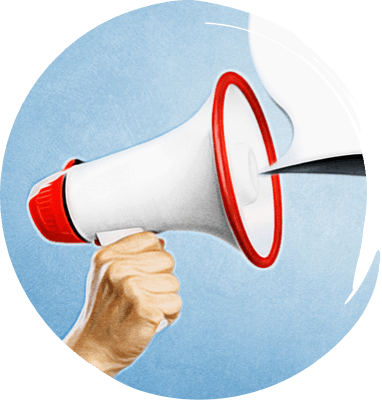
First and foremost, early intervention is key. If you think you see any signs or symptoms, get them checked out—and don’t stop there. Remember, YOU are your child’s most important advocate. No one else will fight for your child the way you will.

Q:Thank you for sharing that difficult experience with us. How is Kalel now, and how is his condition being managed?
A:Today, Kalel is doing incredibly well. He’s a big boy now at 8 years old, although his cognitive level never passed that of a 4-year-old. In the last few years, he’s had multiple surgeries, including carpal tunnel release on his hands and fingers, tarsal tunnel release on his ankles, and Achilles’ tendon lengthening. All these procedures had to be done under anesthesia, which is very high-risk for children with Hunter syndrome, or any other child for that matter.
Kalel receives behavioral, speech, occupational, and physical therapy. He was prescribed hearing aids, but it’s a mission to get him to wear them. He received casting to correct his tiptoe walk. He also uses assistive therapy, like ankle-foot orthosis and hand casts, but he won’t wear any of them for as long as he needs to.
He has to see a long list of specialists regularly. There is the pulmonologist, cardiologist, neurologist, neurosurgeon, ophthalmologist, physiatrist, allergy specialist, orthopedic specialist, ENT specialist, geneticist, behavioral therapist, speech pathologist, occupational therapist, and physical therapist. He visits most of them at least two times a year. He also undergoes a sleep study, MRI, EKG, X-ray, pulmonary checkup, hearing test, and heart checkup twice a year.
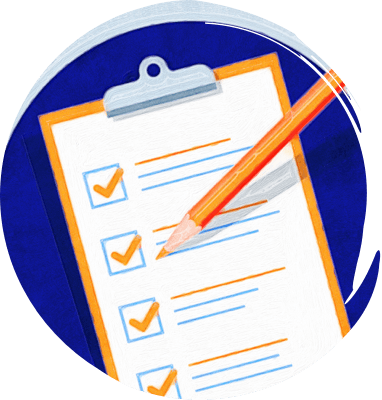
For any other families going through this, I’d recommend you make a checklist to follow up on appointments. Keeping your own agenda helps you stay on top of things.
When Kalel has his appointments, Monica and I take turns to go with him while the other parent stays at home. If that’s not possible, we bring Logan along, but with him there, Kalel has trouble keeping calm in the waiting room. He gets really excited around his little brother.
Taking care of Kalel is like looking after 5 kids at the “terrible twos” stage. Nowadays, we try our best to get everything done and prioritize important things, but we sometimes fall behind from exhaustion.

Q:Looking more at the neuronopathic aspect of the disease, would you mind telling us about Kalel’s cognitive symptoms and whether these have changed over time?
A:The cognitive symptoms started when Kalel was around 18 months old and began developing his speech. We noticed a bit of a delay. Even though he technically met the number of words required for his age, we just knew he was delayed. We got him evaluated and started on speech therapy when he was 2 years old.
Kalel still has trouble learning new things and needs a lot of assistance to complete simple tasks. At about 2 years old, he was almost fully potty trained but refused to use the potty. His attention span is also very limited. Kalel started school at the age of 3 and a half, just after the diagnosis. He slowly gained new skills until about the age of 5, when he plateaued. Fortunately, Kalel has not regressed, but he isn’t progressing either.
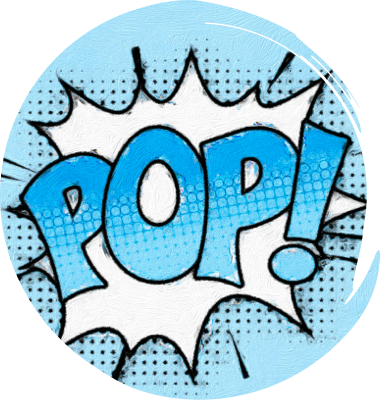
Kalel has what we call a bubble-burster type of personality. If you think of your personal space as a bubble, Kalel will be the one to burst it. Once he’s comfortable with you, he’s in your face!
If you don’t look him in the eye, he’ll pull your chin to get your attention. Because of his claw-like hands, sometimes his nails go right through the skin. Obviously, he doesn’t understand that he’s hurting you, so we’ve gotten better at bobbing and weaving over the years. With his bubble-bursting personality and repeating himself over and over again, some people give us the look, the “Um, come get your kid off me!” look.
Another behavior that sticks out is that he’ll repeat his sentences while talking, almost like he wants to make sure you’ve understood. When you respond, he’ll stop most times.
We’ve had to educate some nieces and nephews to explain why Kalel kept pushing them into bushes or didn’t throw the ball back, or why he would repeat himself a million times. It does hurt us to see other kids try to get away from him because they feel that he is annoying and bothering them. We try our hardest to advocate for him, but it can be hard to constantly be on alert that your child may upset or offend someone, especially when we know he doesn’t mean it and he’s actually a good kid.
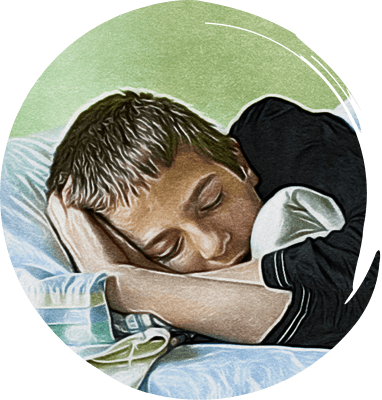
When Kalel is tired, he gets destructive and brings out his infamous, delirious laugh. That’s a sign in our family to run for cover! The only thing that helps is a nap. Even as an 8-year-old, he still naps! Sometimes we drag the younger “big brother,” Logan, in to play pretend naptime and help Kalel calm down and stop fighting sleep.

Q:As a parent, it must be emotionally draining at times to face all these challenges. How do you and your family support each other through difficult times?
A:We try to focus on the positives—our blessings. On the hardest days, this really gets us through. Kalel is the happiest boy you will ever meet, and he can do so many things that the doctors said he wouldn’t be able to do. He can communicate with us and has so many people who love him. He holds no grudges and doesn’t know what it means to be angry. Most importantly, he is still here with us; that alone holds weight over all the negatives.
As parents, we have to come to terms with the fact that he will never have a typical life, and he will experience many challenges that we have no control over. Kalel has already had more procedures than most people will in a hundred years.
It’s difficult, but I believe that if there is something you can do about a situation, do it. And if you can’t do anything, stop worrying. We have learned to be proactive, educated ourselves, and we give Kalel the care he deserves.
To sidetrack for a moment—another challenge many parents like us face is when planning to have more children. Our daughter Anaya was born 5 years after Kalel’s diagnosis. Anaya came along as a wonderful surprise, but as you can imagine, we were also terrified that Hunter syndrome would affect the baby. The moment we found out Monica was expecting, we made appointments with a high-risk obstetrician-gynecologist and a genetic counselor. There was a 50% chance a boy would have Hunter syndrome, so they tested the baby’s sex at 12 weeks. At that point, another test could determine the baby’s MPS status, but that test itself was risky. We were glad to know about all the testing options available but decided that we would keep the baby no matter what, so we only wanted the sex determination tests.
When the results showed we were having a baby girl, it lifted a weight off of our shoulders! Anaya could still be a carrier and pass Hunter syndrome to her children, but we’ll cross that bridge when we get there. We’ll have time to find solutions. I can only imagine what technology will look like 30 years from now.
Getting back to Kalel—with his severe disease, it is very difficult to visit people because of their reaction to his behavior. We feel more comfortable spending time around people who understand him, have more patience with him, and won’t just ignore him, push him away, or even get upset with him.
Kalel is a very loving and affectionate kid. He loves to hug and kiss his family over and over again and constantly seeks attention. We try our best to give him the attention he needs and allow him to show his affection, but when around others, we try to direct his attention towards ourselves, so that others don’t feel uncomfortable or lose their patience. Sometimes it hurts to watch others feel bothered by his bubble-bursting personality, because we know he just wants some love like anyone else does.
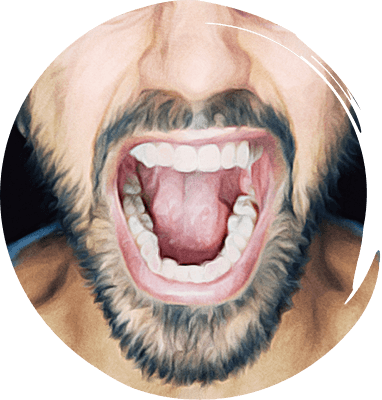
Once in a while, as a stress reliever, I wait until everyone is asleep and I sneak out the house. I walk down the driveway and get in my car. I hold on tight to the steering wheel and I just SCREAM. I breathe in through my nose, out through my mouth, relax my shoulders, and close my eyes. Honestly, it’s like a bottle of soda when you first crack it open. This definitely helps me relieve some of the built-up emotions.

Q:Yes, I understand how incredibly stressful it can be as a parent, but there must be some positive and rewarding aspects to your journey as well. Would you please share any of the silver linings you have experienced?
A:It sounds like you’re defining what my wife and I like to call “collateral beauty,” like a rose growing from the concrete. Something so devastating has happened to us, yet the sun still shines through.
A huge chunk of collateral beauty comes from the Hunter syndrome community. We are random strangers across the world, banded together by a horrifying disease that’s taken control of our children. Somehow, we are the only ones who truly understand one another.
I cannot stress enough the importance of the National MPS Society, especially for newly diagnosed families. They have a real talent for bringing the community together and are true advocates for us all on every level.
Then there are our family and friends, who have been with us through thick and thin. They’ve been there in the fundraisers, campaigns, long hours at events, and most importantly, they opened their big hearts for my son and family.
Hunter syndrome is a horrible way to bring people together, but that’s what it has done. My 14-year-old niece also started the Making People Smile Foundation, or MPS Foundation for short. She did it in honor of her cousin Kalel.
In terms of future aspirations for Kalel, I’ve come to accept that my child will never be typical. To be frank, even I’m not a very typical person! And I’m OK with that. My only wish is to give my son the best possible quality of life and give him more years than the research suggests is possible. For other families and future diagnoses, I hope mandatory newborn screening is passed and the best treatment for our boys becomes available in time to save as many of our kiddos as possible.
My philosophy is to keep it simple and never give up on hope for a better quality of life. Your child is counting on you. No matter how bad the situation is, no matter how severe an illness gets, no matter what the Internet tells you, hold on to your hope.
Tagged in: Caregiver, parenthood, community & relationships, family
